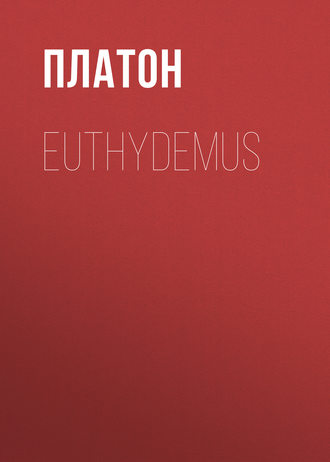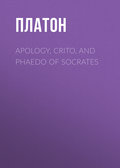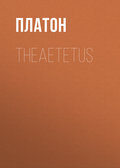
Платон
Euthydemus
The wise, replied Cleinias.
Then after all the wise are the learners and not the unlearned; and your last answer to Euthydemus was wrong.
Then once more the admirers of the two heroes, in an ecstasy at their wisdom, gave vent to another peal of laughter, while the rest of us were silent and amazed. Euthydemus, observing this, determined to persevere with the youth; and in order to heighten the effect went on asking another similar question, which might be compared to the double turn of an expert dancer. Do those, said he, who learn, learn what they know, or what they do not know?
Again Dionysodorus whispered to me: That, Socrates, is just another of the same sort.
Good heavens, I said; and your last question was so good!
Like all our other questions, Socrates, he replied – inevitable.
I see the reason, I said, why you are in such reputation among your disciples.
Meanwhile Cleinias had answered Euthydemus that those who learned learn what they do not know; and he put him through a series of questions the same as before.
Do you not know letters?
He assented.
All letters?
Yes.
But when the teacher dictates to you, does he not dictate letters?
To this also he assented.
Then if you know all letters, he dictates that which you know?
This again was admitted by him.
Then, said the other, you do not learn that which he dictates; but he only who does not know letters learns?
Nay, said Cleinias; but I do learn.
Then, said he, you learn what you know, if you know all the letters?
He admitted that.
Then, he said, you were wrong in your answer.
The word was hardly out of his mouth when Dionysodorus took up the argument, like a ball which he caught, and had another throw at the youth. Cleinias, he said, Euthydemus is deceiving you. For tell me now, is not learning acquiring knowledge of that which one learns?
Cleinias assented.
And knowing is having knowledge at the time?
He agreed.
And not knowing is not having knowledge at the time?
He admitted that.
And are those who acquire those who have or have not a thing?
Those who have not.
And have you not admitted that those who do not know are of the number of those who have not?
He nodded assent.
Then those who learn are of the class of those who acquire, and not of those who have?
He agreed.
Then, Cleinias, he said, those who do not know learn, and not those who know.
Euthydemus was proceeding to give the youth a third fall; but I knew that he was in deep water, and therefore, as I wanted to give him a respite lest he should be disheartened, I said to him consolingly: You must not be surprised, Cleinias, at the singularity of their mode of speech: this I say because you may not understand what the two strangers are doing with you; they are only initiating you after the manner of the Corybantes in the mysteries; and this answers to the enthronement, which, if you have ever been initiated, is, as you will know, accompanied by dancing and sport; and now they are just prancing and dancing about you, and will next proceed to initiate you; imagine then that you have gone through the first part of the sophistical ritual, which, as Prodicus says, begins with initiation into the correct use of terms. The two foreign gentlemen, perceiving that you did not know, wanted to explain to you that the word 'to learn' has two meanings, and is used, first, in the sense of acquiring knowledge of some matter of which you previously have no knowledge, and also, when you have the knowledge, in the sense of reviewing this matter, whether something done or spoken by the light of this newly-acquired knowledge; the latter is generally called 'knowing' rather than 'learning,' but the word 'learning' is also used; and you did not see, as they explained to you, that the term is employed of two opposite sorts of men, of those who know, and of those who do not know. There was a similar trick in the second question, when they asked you whether men learn what they know or what they do not know. These parts of learning are not serious, and therefore I say that the gentlemen are not serious, but are only playing with you. For if a man had all that sort of knowledge that ever was, he would not be at all the wiser; he would only be able to play with men, tripping them up and oversetting them with distinctions of words. He would be like a person who pulls away a stool from some one when he is about to sit down, and then laughs and makes merry at the sight of his friend overturned and laid on his back. And you must regard all that has hitherto passed between you and them as merely play. But in what is to follow I am certain that they will exhibit to you their serious purpose, and keep their promise (I will show them how); for they promised to give me a sample of the hortatory philosophy, but I suppose that they wanted to have a game with you first. And now, Euthydemus and Dionysodorus, I think that we have had enough of this. Will you let me see you explaining to the young man how he is to apply himself to the study of virtue and wisdom? And I will first show you what I conceive to be the nature of the task, and what sort of a discourse I desire to hear; and if I do this in a very inartistic and ridiculous manner, do not laugh at me, for I only venture to improvise before you because I am eager to hear your wisdom: and I must therefore ask you and your disciples to refrain from laughing. And now, O son of Axiochus, let me put a question to you: Do not all men desire happiness? And yet, perhaps, this is one of those ridiculous questions which I am afraid to ask, and which ought not to be asked by a sensible man: for what human being is there who does not desire happiness?
There is no one, said Cleinias, who does not.
Well, then, I said, since we all of us desire happiness, how can we be happy? – that is the next question. Shall we not be happy if we have many good things? And this, perhaps, is even a more simple question than the first, for there can be no doubt of the answer.
He assented.
And what things do we esteem good? No solemn sage is required to tell us this, which may be easily answered; for every one will say that wealth is a good.
Certainly, he said.
And are not health and beauty goods, and other personal gifts?
He agreed.
Can there be any doubt that good birth, and power, and honours in one's own land, are goods?
He assented.
And what other goods are there? I said. What do you say of temperance, justice, courage: do you not verily and indeed think, Cleinias, that we shall be more right in ranking them as goods than in not ranking them as goods? For a dispute might possibly arise about this. What then do you say?
They are goods, said Cleinias.
Very well, I said; and where in the company shall we find a place for wisdom – among the goods or not?
Among the goods.
And now, I said, think whether we have left out any considerable goods.
I do not think that we have, said Cleinias.
Upon recollection, I said, indeed I am afraid that we have left out the greatest of them all.
What is that? he asked.
Fortune, Cleinias, I replied; which all, even the most foolish, admit to be the greatest of goods.
True, he said.
On second thoughts, I added, how narrowly, O son of Axiochus, have you and I escaped making a laughing-stock of ourselves to the strangers.
Why do you say so?
Why, because we have already spoken of good-fortune, and are but repeating ourselves.
What do you mean?
I mean that there is something ridiculous in again putting forward good-fortune, which has a place in the list already, and saying the same thing twice over.
He asked what was the meaning of this, and I replied: Surely wisdom is good-fortune; even a child may know that.
The simple-minded youth was amazed; and, observing his surprise, I said to him: Do you not know, Cleinias, that flute-players are most fortunate and successful in performing on the flute?
He assented.
And are not the scribes most fortunate in writing and reading letters?
Certainly.
Amid the dangers of the sea, again, are any more fortunate on the whole than wise pilots?
None, certainly.
And if you were engaged in war, in whose company would you rather take the risk – in company with a wise general, or with a foolish one?
With a wise one.
And if you were ill, whom would you rather have as a companion in a dangerous illness – a wise physician, or an ignorant one?
A wise one.
You think, I said, that to act with a wise man is more fortunate than to act with an ignorant one?
He assented.
Then wisdom always makes men fortunate: for by wisdom no man would ever err, and therefore he must act rightly and succeed, or his wisdom would be wisdom no longer.
We contrived at last, somehow or other, to agree in a general conclusion, that he who had wisdom had no need of fortune. I then recalled to his mind the previous state of the question. You remember, I said, our making the admission that we should be happy and fortunate if many good things were present with us?
He assented.
And should we be happy by reason of the presence of good things, if they profited us not, or if they profited us?
If they profited us, he said.
And would they profit us, if we only had them and did not use them? For example, if we had a great deal of food and did not eat, or a great deal of drink and did not drink, should we be profited?
Certainly not, he said.
Or would an artisan, who had all the implements necessary for his work, and did not use them, be any the better for the possession of them? For example, would a carpenter be any the better for having all his tools and plenty of wood, if he never worked?
Certainly not, he said.
And if a person had wealth and all the goods of which we were just now speaking, and did not use them, would he be happy because he possessed them?
No indeed, Socrates.
Then, I said, a man who would be happy must not only have the good things, but he must also use them; there is no advantage in merely having them?
True.
Well, Cleinias, but if you have the use as well as the possession of good things, is that sufficient to confer happiness?
Yes, in my opinion.
And may a person use them either rightly or wrongly?
He must use them rightly.
That is quite true, I said. And the wrong use of a thing is far worse than the non-use; for the one is an evil, and the other is neither a good nor an evil. You admit that?
He assented.
Now in the working and use of wood, is not that which gives the right use simply the knowledge of the carpenter?
Nothing else, he said.
And surely, in the manufacture of vessels, knowledge is that which gives the right way of making them?
He agreed.
And in the use of the goods of which we spoke at first – wealth and health and beauty, is not knowledge that which directs us to the right use of them, and regulates our practice about them?
He assented.
Then in every possession and every use of a thing, knowledge is that which gives a man not only good-fortune but success?
He again assented.
And tell me, I said, O tell me, what do possessions profit a man, if he have neither good sense nor wisdom? Would a man be better off, having and doing many things without wisdom, or a few things with wisdom? Look at the matter thus: If he did fewer things would he not make fewer mistakes? if he made fewer mistakes would he not have fewer misfortunes? and if he had fewer misfortunes would he not be less miserable?
Certainly, he said.
And who would do least – a poor man or a rich man?
A poor man.
A weak man or a strong man?
A weak man.
A noble man or a mean man?
A mean man.
And a coward would do less than a courageous and temperate man?
Yes.
And an indolent man less than an active man?
He assented.
And a slow man less than a quick; and one who had dull perceptions of seeing and hearing less than one who had keen ones?
All this was mutually allowed by us.
Then, I said, Cleinias, the sum of the matter appears to be that the goods of which we spoke before are not to be regarded as goods in themselves, but the degree of good and evil in them depends on whether they are or are not under the guidance of knowledge: under the guidance of ignorance, they are greater evils than their opposites, inasmuch as they are more able to minister to the evil principle which rules them; and when under the guidance of wisdom and prudence, they are greater goods: but in themselves they are nothing?
That, he replied, is obvious.
What then is the result of what has been said? Is not this the result – that other things are indifferent, and that wisdom is the only good, and ignorance the only evil?
He assented.
Let us consider a further point, I said: Seeing that all men desire happiness, and happiness, as has been shown, is gained by a use, and a right use, of the things of life, and the right use of them, and good-fortune in the use of them, is given by knowledge, – the inference is that everybody ought by all means to try and make himself as wise as he can?
Yes, he said.
And when a man thinks that he ought to obtain this treasure, far more than money, from a father or a guardian or a friend or a suitor, whether citizen or stranger – the eager desire and prayer to them that they would impart wisdom to you, is not at all dishonourable, Cleinias; nor is any one to be blamed for doing any honourable service or ministration to any man, whether a lover or not, if his aim is to get wisdom. Do you agree? I said.
Yes, he said, I quite agree, and think that you are right.
Yes, I said, Cleinias, if only wisdom can be taught, and does not come to man spontaneously; for this is a point which has still to be considered, and is not yet agreed upon by you and me —
But I think, Socrates, that wisdom can be taught, he said.
Best of men, I said, I am delighted to hear you say so; and I am also grateful to you for having saved me from a long and tiresome investigation as to whether wisdom can be taught or not. But now, as you think that wisdom can be taught, and that wisdom only can make a man happy and fortunate, will you not acknowledge that all of us ought to love wisdom, and you individually will try to love her?
Certainly, Socrates, he said; I will do my best.
I was pleased at hearing this; and I turned to Dionysodorus and Euthydemus and said: That is an example, clumsy and tedious I admit, of the sort of exhortations which I would have you give; and I hope that one of you will set forth what I have been saying in a more artistic style: or at least take up the enquiry where I left off, and proceed to show the youth whether he should have all knowledge; or whether there is one sort of knowledge only which will make him good and happy, and what that is. For, as I was saying at first, the improvement of this young man in virtue and wisdom is a matter which we have very much at heart.
Thus I spoke, Crito, and was all attention to what was coming. I wanted to see how they would approach the question, and where they would start in their exhortation to the young man that he should practise wisdom and virtue. Dionysodorus, who was the elder, spoke first. Everybody's eyes were directed towards him, perceiving that something wonderful might shortly be expected. And certainly they were not far wrong; for the man, Crito, began a remarkable discourse well worth hearing, and wonderfully persuasive regarded as an exhortation to virtue.
Tell me, he said, Socrates and the rest of you who say that you want this young man to become wise, are you in jest or in real earnest?
I was led by this to imagine that they fancied us to have been jesting when we asked them to converse with the youth, and that this made them jest and play, and being under this impression, I was the more decided in saying that we were in profound earnest. Dionysodorus said:
Reflect, Socrates; you may have to deny your words.
I have reflected, I said; and I shall never deny my words.
Well, said he, and so you say that you wish Cleinias to become wise?
Undoubtedly.
And he is not wise as yet?
At least his modesty will not allow him to say that he is.
You wish him, he said, to become wise and not, to be ignorant?
That we do.
You wish him to be what he is not, and no longer to be what he is?
I was thrown into consternation at this.
Taking advantage of my consternation he added: You wish him no longer to be what he is, which can only mean that you wish him to perish. Pretty lovers and friends they must be who want their favourite not to be, or to perish!
When Ctesippus heard this he got very angry (as a lover well might) and said: Stranger of Thurii – if politeness would allow me I should say, A plague upon you! What can make you tell such a lie about me and the others, which I hardly like to repeat, as that I wish Cleinias to perish?
Euthydemus replied: And do you think, Ctesippus, that it is possible to tell a lie?
Yes, said Ctesippus; I should be mad to say anything else.
And in telling a lie, do you tell the thing of which you speak or not?
You tell the thing of which you speak.
And he who tells, tells that thing which he tells, and no other?
Yes, said Ctesippus.
And that is a distinct thing apart from other things?
Certainly.
And he who says that thing says that which is?
Yes.
And he who says that which is, says the truth. And therefore Dionysodorus, if he says that which is, says the truth of you and no lie.
Yes, Euthydemus, said Ctesippus; but in saying this, he says what is not.
Euthydemus answered: And that which is not is not?
True.
And that which is not is nowhere?
Nowhere.
And can any one do anything about that which has no existence, or do to Cleinias that which is not and is nowhere?
I think not, said Ctesippus.
Well, but do rhetoricians, when they speak in the assembly, do nothing?
Nay, he said, they do something.
And doing is making?
Yes.
And speaking is doing and making?
He agreed.
Then no one says that which is not, for in saying what is not he would be doing something; and you have already acknowledged that no one can do what is not. And therefore, upon your own showing, no one says what is false; but if Dionysodorus says anything, he says what is true and what is.
Yes, Euthydemus, said Ctesippus; but he speaks of things in a certain way and manner, and not as they really are.
Why, Ctesippus, said Dionysodorus, do you mean to say that any one speaks of things as they are?
Yes, he said – all gentlemen and truth-speaking persons.
And are not good things good, and evil things evil?
He assented.
And you say that gentlemen speak of things as they are?
Yes.
Then the good speak evil of evil things, if they speak of them as they are?
Yes, indeed, he said; and they speak evil of evil men. And if I may give you a piece of advice, you had better take care that they do not speak evil of you, since I can tell you that the good speak evil of the evil.
And do they speak great things of the great, rejoined Euthydemus, and warm things of the warm?
To be sure they do, said Ctesippus; and they speak coldly of the insipid and cold dialectician.
You are abusive, Ctesippus, said Dionysodorus, you are abusive!
Indeed, I am not, Dionysodorus, he replied; for I love you and am giving you friendly advice, and, if I could, would persuade you not like a boor to say in my presence that I desire my beloved, whom I value above all men, to perish.
I saw that they were getting exasperated with one another, so I made a joke with him and said: O Ctesippus, I think that we must allow the strangers to use language in their own way, and not quarrel with them about words, but be thankful for what they give us. If they know how to destroy men in such a way as to make good and sensible men out of bad and foolish ones – whether this is a discovery of their own, or whether they have learned from some one else this new sort of death and destruction which enables them to get rid of a bad man and turn him into a good one – if they know this (and they do know this – at any rate they said just now that this was the secret of their newly-discovered art) – let them, in their phraseology, destroy the youth and make him wise, and all of us with him. But if you young men do not like to trust yourselves with them, then fiat experimentum in corpore senis; I will be the Carian on whom they shall operate. And here I offer my old person to Dionysodorus; he may put me into the pot, like Medea the Colchian, kill me, boil me, if he will only make me good.
Ctesippus said: And I, Socrates, am ready to commit myself to the strangers; they may skin me alive, if they please (and I am pretty well skinned by them already), if only my skin is made at last, not like that of Marsyas, into a leathern bottle, but into a piece of virtue. And here is Dionysodorus fancying that I am angry with him, when really I am not angry at all; I do but contradict him when I think that he is speaking improperly to me: and you must not confound abuse and contradiction, O illustrious Dionysodorus; for they are quite different things.






